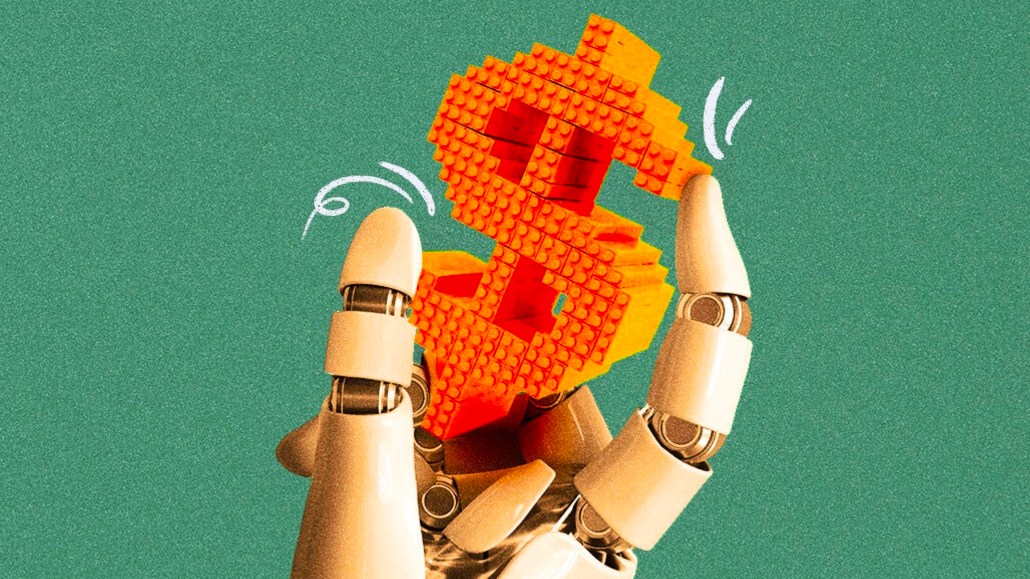Secure your place at the Digiday Media Buying Summit in Nashville, March 2-4
Ikea launched an AI assistant earlier this year. Has it actually driven sales?

Chatbot assistants emerged last year as one of the first real applications of generative AI for marketers. Companies such as Ikea, Klarna, B&Q owner Kingfisher, Mastercard, Uber Eats and L’Oréal have each launched AI chatbots of one type or another.
What’s less clear, though, is what impact — if any — those assistants have actually had on sales.
Ikea made its “AI Assistant” available to the public three months ago via the OpenAI GPT store. According to Francesco Marzoni, the retailer’s chief data and analytics officer, it’s clocked 1,500 users a month. Twenty percent of those interactions have resulted in visits to the Ikea website, mostly to look at its outdoor furniture and sofa ranges. Five percent of those visits resulted in a transaction, he said.
Principally the AI Assistant chats about furniture choices with users, answering questions and trading suggestions. Its primary means of engagement, though, is sending users toward the Ikea website to read a blog post or, ideally, to buy something.
Marzoni conceded that there are open questions over some of Ikea’s initial findings about its AI Assistant. It’s unclear how well ChatGPT Pro users (the GPT store was only available to those with a subscription until mid-May) overlap with Ikea consumers. And the true length of the journey to a transaction is unclear, because users might have browsed the Ikea website or consumed its content prior to the GPT interaction.
Though Marzoni said that the monthly user base was “not a bad number per se,” he also said he thinks it’s a small sample size to base major commercial assumptions upon. But sales, he added, aren’t “necessarily the most important metric” to measure the impact of the chatbot.
Instead, the assistant has primarily been a means of learning what it would take to build a functional GPT, test hypotheses around search behavior and determine whether the GPT store itself could be used for customer acquisition, versus integrating the tech directly into Ikea’s owned sites. Marzoni said Ikea has been taking a “humble and responsible approach” to the technology.
Klarna, by contrast, deployed its AI assistant right into the thick of it. In January, the finance brand added an OpenAI-enabled chatbot assistant to its website. The assistant handles returns, refunds and provides customer advice, and in the four months since launch, a Klarna spokesperson told Digiday in an email, it’s consistently handled two-thirds of customer service queries on the site, amounting to over 6 million conversations.
According to Nicole Greene, vp and analyst for Gartner, Klarna’s integration is typical of the experiments launched by marketers, in that they’re focused on triaging or solving consumer issues rather than driving outright sales. “The majority of applications are nominally centered on customer service,” she said.
The speed and availability of an AI assistant (the latter especially important for a finance brand) can help raise customer satisfaction, according to Julia de Sainte Marie, managing partner of experience unit Ogilvy One at Ogilvy Paris. She said that assistants like Klarna’s and Ikea’s are ”a true game changer in our way to design customer experience strategy.”
Those effects are being borne out at Klarna. Repeat inquiries are down 25% and customer satisfaction scores equal those of its human customer service professionals, the Klarna spokesperson said. The company estimated in a February blog post that it would add $40 million to its profit margin over the course of 2024.
When Ikea first launched its AI-based assistant, Ikea’s team had to change tack so that their application didn’t endanger customers with bad advice. Marzoni said in the first days after its launch, several users used the GPT to ask about DIY modifications they might make to Ikea products, and that the GPT didn’t initially give out correct (or safe) information in response. Future chatbot applications, he suggested, would be built with this in mind from the beginning.
Marzoni said the GPT experiment had “validated” a hypothesis within the company that generative AI is set to change search behavior. Most of the users of Ikea’s assistant treated it like an advanced search engine — a pattern that could inspire future development.
Greene said that if companies like Ikea can use AI assistants to speed up customer search inquiries, there’s value to be unlocked. “The consistent theme here is that customers want to find value faster,” said Greene. “We’re actually finding that consumers are very favorable to search generative experiences, because they’re presenting opportunities and decisions faster.”
“Search is expected to change forever,” said Marzoni, who added that Ikea plans to investigate further ChatGPT integrations with its search tools. “We’ll now be working in that direction in our website, in the app, potentially also in our digital touchpoints in stores.”
More in Marketing

Thrive Market’s Amina Pasha believes brands that focus on trust will win in an AI-first world
Amina Pasha, CMO at Thrive Market, believes building trust can help brands differentiate themselves.

Despite flight to fame, celeb talent isn’t as sure a bet as CMOs think
Brands are leaning more heavily on celebrity talent in advertising. Marketers see guaranteed wins in working with big names, but there are hidden risks.

With AI backlash building, marketers reconsider their approach
With AI hype giving way to skepticism, advertisers are reassessing how the technology fits into their workflows and brand positioning.







